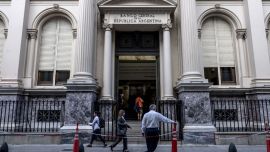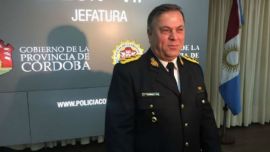President Alberto Fernández on Wednesday announced new restrictions for an initial three weeks to deal with what the national government is effectively calling a virulent second wave of Covid-19. Public transport will be limited to essential workers (78 job descriptions allowed) and a night curfew was announced (midnight to 6am). Shops will open at 10am. Social meetings at home will be banned.
Some 20,000 cases are now being reported daily on average. But you need only to ponder the body language of the president’s televised announcement to realise that the situation is turning ugly. Fernández himself is isolated in a guesthouse at the Olivos presidential residential compound recovering from Covid-19. The president went down with the virus late last week, even after receiving the Russian-made Sputnik V vaccine recently. Fernández, who turned 62 on April 2 and suffers from chronic lung problems, delivered his speech from an outdoor square in the presidential compound. As he spoke, Fernández tripped over his words at times slightly and looked sapped of all energy, despite only dealing with mild symptoms.
The second wave is here and it already looks challenging. A winter of discontent looms ahead of the midterm elections. Both Fernández and Health Minister Carla Vizzotti said the next three weeks will be crucial. The government hopes the restrictions will buy it time to continue its campaign to vaccinate the elderly in a bid to take the stress off the healthcare system with the number of cases increasing. Buenos Aires City Mayor Horacio Rodríguez Larreta, a centre-right coalition opposition leader, on Thursday said his municipal administration does not agree with the night-time curfew. Technically, the mayor has no option but to accept the restriction because a presidential decree will be issued. Rodríguez Larreta said the spirit of the curfew is to clamp down on night-time revellers and not people going home from work. He also urged people with symptoms to seek Covid-19 tests.
Buenos Aires Province Governor Axel Kicillof, a member of the president’s centre-left Peronist coalition, warned about a hike in cases and insisted urgent measures were needed to stop intensive care units from filling up. The governor on Thursday said the situation was “horrifying” especially in intensive care units. “It’s not a wave, it’s a tsunami,” he declared dramatically. Kicillof rules over Greater Buenos Aires, the sprawling urban belt that surrounds Buenos Aires City. Effectively this giant metropolitan area (Buenos Aires City plus Greater Buenos Aires) is the region hardest hit by the second wave unfolding while authorities lead a vaccination drive with a limited number of vaccines at hand. The political difficulty is that Buenos Aires City is a bastion of the centre-right coalition Juntos por el Cambiom, while working class Greater Buenos Aires is the stronghold of the ruling Peronist coalition Frente de Todos.
Rodríguez Larreta, a potential presidential candidate in 2023, has preached moderation during the pandemic. He initially worked with Fernández and Kicillof, often sharing press conferences to make announcements last year. But now the negotiations between the national government with Rodríguez Larreta are stealthy and announcements are made separately. The mayor on Thursday clearly underlined that he did not agree with the night-time curfew and polls show the public is more worried about the economic situation during lockdowns than the virus itself.
Juntos por el Cambio has a hawkish confrontational wing headed by former president Mauricio Macri and his former security minister Patricia Bullrich. The coalition’s leadership huddled to discuss the situation in Palermo and issued a statement declaring authorities must strive for everyday life to continue “as normal as possible.” Macri and Bullrich favour constant agitation against the national government and don't necessarily look like they are ready to endorse Rodríguez Larreta’s potential presidential bid. They could even defy Rodríguez Larreta by pushing for Bullrich to head the slate of congressional candidates in Buenos Aires City against the mayor’s wishes.
The second wave looks real and it is sobering. But what is also real is the bickering in an election year. The national government at press time for this column was formally opening negotiations with opposition lawmakers in Congress to postpone the compulsory PASO primary elections scheduled for August for a month, then move the midterm elections from October to November. The irony is that Juntos por el Cambio may need the PASO elections to sort out its own internal differences. Some opposition lawmakers fear the Peronist administration will use the issue to drastically alter the electoral system. One option floated by some ruling party officials, including Lower House Speaker Sergio Massa, was combining the primary vote with the midterm vote and holding them on the same day. Massa could be promoting this double simultaneous vote (meaning a voter can choose a coalition and a specific faction within that coalition at the same time) as a move to force the opposition to sit down at the negotiating table.
Argentina’s two leading camps continue to go about their political business, constantly throwing jabs at each other. The pandemic bickering is about restrictions, electoral schedules and vaccines. There are also growing calls from the opposition for municipal governments and private sector firms to be allowed to purchase vaccines independently. Cabinet Chief Santiago Cafiero reacted to the lobbying by declaring that local governments and the private sector are not banned from buying jabs. Rodríguez Larreta’s health minister on Thursday said the issue was an abstract idea, because there is no way vaccines can be bought quickly right now. End of (that) argument. For now.



















Comments